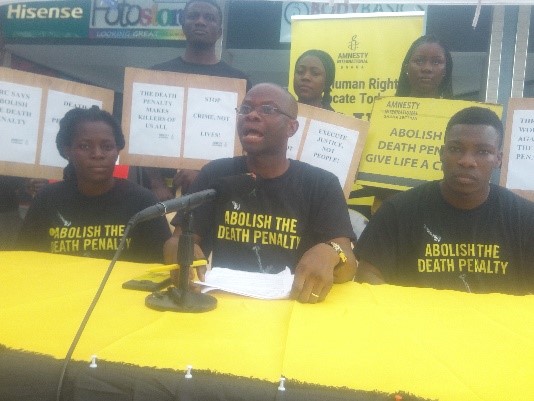
Amnesty Internaitonal Ghana (AI) has noted that society has neglected the plight of children and families of people on death roll and called on the government to abolish death penalty to give them the right to hope.
According to Amnesty International Ghana, it is high time the government of Ghana implement the report of the Constitutional Review Commission which recommended the abolishment of the death penalty.
“The reality of death penalty is the fact that, it has some social effects on society especially for many left behind and has the tendency to reduce capital punishment.”
Speaking to Starrfm.com.gh at the 17th World Day Against Death Penalty event 2019, at the Achimota Mall over the weekend, the Campaign and Fundraising Coordinator of AI Ghana, Mr Samuel Agbotse said death sentence does not offers the illusion of closure and vindication.
However, the impact of it on the children of persons on death roll live a-long-lasting illusion and no execution can bring back a loved one or a heart terribly wounded.
Speaking on the theme ‘Children; Unseen Victims of Death Penalty,’ Mr Agbotse said the pain and loss of one death cannot be wiped away by another death.
“The impact of the death penalty on society varies depending on number of factors; which include age, closeness of an individual or group to the incidence. How do you feel as a wife, husband, a child, mother, father, friends, colleagues to a pending execution of a love one?” he stated.
Impact of children
Mr Agbotse said the rights of children of parents sentenced on death penalty are largely been neglected and there is no available data on the number of children whose parents were sentenced to death making it difficult to get any kind of support from society.
According to the UN special report on the effect of the death penalty on children, there is some promising developments at the global level, where in September 2013, the Human Rights Council of the United Nations held an important panel discussion on the rights of children of parents on death roll.
The Committee discussing on the Rights of the Child has addressed it in reviewing States parties’ reports on national implementation of the Convention on the Rights of the Child. The topic has also been raised in the Universal Periodic Review process.
He said the stigma faced by children whose parent has been sentenced to death may thus be compounded by multiple other forms of discrimination adding that the right to freedom from violence as in (Article 19) is not safeguarded, therefore their right to special protection and assistance when state action causes a child to be deprived of his or her family as in (article 20) is not given due attention.
Mr Agbotse added that the child is deprived of adequate standard of living, either physical, mental, spiritual, moral and social development as in (article 27(1)) is not fulfilled and many other rights being violated by the state in the death sentence and execution.
The execution of a parent; the provider and protective figure in a child’s life may cause a considerable internal conflict for the child and lead to a complex later relationship with the state and the community at large.
“Children may understand that a parent has done wrong and needs to be held accountable. But they are unable to understand and accept that the state would deliberately plans to kill their parent. This may trigger a lack of trust in legislators, law enforcement, the judiciary, and reflect in their behavior and integration into society later in life,” he stated.
Statistics
According to Amnesty International Global Report on statistics on the death penalty, as at December 31, 2018, 12 people had been sentenced to death and at the end of the year 2018, 172 people were under sentence of death, including seven foreign nationals, one from Benin, two from Burkina Faso, three from Nigeria and another from one Britain.
Available statistics in 2019, states that at least eight people has been sentenced this year making the number 180 prisoners under the death sentence; assuming each of the 180 people on death role have an average child of 3 or 4. “We are looking at 540 to 720 children directly affected by the death penalty.”
Global picture on West Africa
West African countries that has abolish the death penalty are Togo 2009, Benin 2016 and Burkina Faso 2019 but Ghana who thwart itself as a beacon of democracy and human rights is yet to abolish it.
Source: Ghana/Starrfm.com.gh/Philip Antoh




